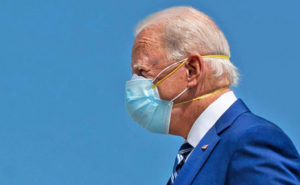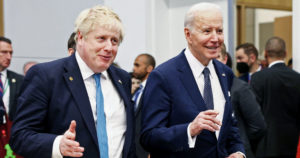A year ago, the governor of the Bank of England tried to downplay growing fears of inflation. Any increase, Andrew Bailey assured us, was understandable given the “bumpy” economic recovery after the pandemic, and he expected “it to come back on target”. It was a view shared by many of the world’s leading economists, including Nobel Prize-winner Paul Krugman. But that didn’t stop it from being wrong: last week, Bailey raised the BoE’s base rate of interest from 1.25% to 1.75% — the biggest rate rise Britain has seen in 27 years.
Why were their crystal balls so inaccurate? Was today’s inflation simply unforeseeable? The straightforward answer is: no. The initial inflation was caused by the disruptions brought on by the lockdowns and was perfectly foreseeable using basic macroeconomic models taught in undergraduate classes. Yet most economists seem to have missed this — largely because, starting in March 2020, they stopped focusing on economic problems and became armchair epidemiologists, offering opinions on how the virus spread and what might stop it.
There was no meaningful economic discussion during the pandemic; normal repairs and maintenance appear to have been neglected, leading to serious problems with supply chains. In 2021, for example, there were 1,946 factory fires — the most ever recorded in a single year and an increase of 129% over the previous year. And these problems have been supercharged by recent geopolitical developments, the most obvious being the war in Ukraine.
As with the lockdowns, economists and policymakers repeatedly misjudged the effect of imposing sanctions on Russia. Most commentators thought they would lead to a collapse in the rouble and the disintegration of the Russian economy. The sanctions would “reduce the rouble to rubble”, predicted Joe Biden. This has not happened. The rouble is currently 30% higher than it was pre-war and while Russia is facing down a recession, the Bank of Russia is slashing interest rates rapidly, signalling that the worst is over.
While the sanctions have not impacted Russia as many assumed they would, they have crippled the Western economies. Before the war, it was fashionable to say that Russia only had an economy the size of Italy’s. This was always misleading. When properly adjusted for relative prices, Russia has an economy substantially larger than the United Kingdom. And it is not simply the size of the Russian economy that was underestimated, but also its importance in the markets for core goods.
For example, Russia produces large amounts of the world’s fertiliser. It accounts for 19%, 15% and 14% of the world’s potassium, nitrogen, and phosphorus exports respectively. Fertiliser is obviously key to growing foods, so disruptions to these markets tend to increase food inflation. Russia produces large amounts of basic foodstuffs too, and is the largest wheat exporter in the world. Put simply, the Russians punch above their weight in the production of the necessities for life. While they may not, say, have a world-leading social media industry, they produce a great deal of the goods that we simply cannot do without.
But Russia’s real economic trump card is energy exports, particularly energy exports to Europe. Prior to the war, 40% of gas and around 25% of oil consumed in Europe came from Russia. And as European countries have ramped up weapons shipments to Ukraine, Russia has started to close the taps, driving up prices and further exacerbating the inflation.
These are the most powerful short-term drivers of inflation, but if we look further down the track there are long-term trends that look even more ominous. It is, for instance, becoming increasingly clear that the war in Ukraine has driven Russia and China much closer together, with the two countries opening up important new trade links. This appears to be part of a broader shift in which the BRICs countries (Brazil, Russia, India and China), as well as Argentina, Iran, and Saudi Arabia, attempt to decouple from the Western-led global economic system. Recently, the BRICs announced that they would attempt to establish a new reserve currency to challenge the US dollar.
Until now, the West has benefited from the cheap labour and raw materials provided by the developing world. But at a certain point it was inevitable that the developing world would decide it is done playing second fiddle to the West. That day appears to be here, with Russia and China ushering in this new age. Without easy access to cheap labour and raw materials, prices in the West will have to rise — and living standards will have to fall accordingly.
Amid all this, there is every chance the BoE will find it cannot control inflation. Normal or “cyclical” inflation occurs when the economy runs too hot, labour markets tighten up and workers demand higher wages, which are then passed on to consumers in the form of higher prices. Central banks then raise interest rates to slow the economy and the inflation is rung out of the system.
Yet while wages are certainly rising now, it is not clear that this is a core driver of inflation. More likely, the inflation is being driven by the after-effects of lockdowns and by the enormous and chaotic geopolitical shifts that we are witnessing. And if this is true then interest rate hikes by the BoE could make the situation even worse. It wouldn’t just cause a recession, but an inflationary recession — the worst of all possible outcomes, as it means rising unemployment and rising prices.
The BoE does appear to be aware of this prospect. In their Monetary Policy Report in May, they stated that they “can’t do anything about the global supply problems or the energy prices that are currently pushing up inflation”. So why are they proceeding with the interest rate hikes? The most likely answer is that they realise that they need to try something. If inflation gets completely out of control, it will crush living standards and irreparably damage the economy. The BoE likely figures that they need to give tightening monetary policy a shot and see if it works. If it does, then they will have done their job; if it doesn’t, at least they know that they tried their best.
Either way, the stakes are enormously high. If the BoE fails to squeeze inflation out of the system and it turns out that price rises are reflective of a new global economic order, living standards in Western countries will decline at a rate never seen before in history. Since the Second World War, and especially in the last 40 or so years, we in the West have based our entire way of life around commerce and rising living standards. If it turns out that this era is now over, how will we choose to live? Will we be able to accept a lower standard of living? Or will modern society fragment? If the interest rate hikes by the BoE fail to tame inflation, we could soon be about to find out.
Disclaimer
Some of the posts we share are controversial and we do not necessarily agree with them in the whole extend. Sometimes we agree with the content or part of it but we do not agree with the narration or language. Nevertheless we find them somehow interesting, valuable and/or informative or we share them, because we strongly believe in freedom of speech, free press and journalism. We strongly encourage you to have a critical approach to all the content, do your own research and analysis to build your own opinion.
We would be glad to have your feedback.
Source: UnHerd Read the original article here: https://unherd.com/




